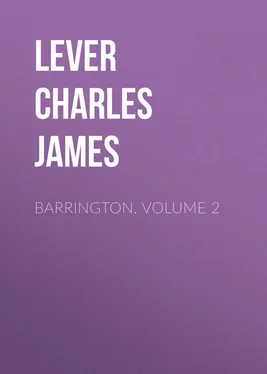Charles Lever - Barrington. Volume 2
Здесь есть возможность читать онлайн «Charles Lever - Barrington. Volume 2» — ознакомительный отрывок электронной книги совершенно бесплатно, а после прочтения отрывка купить полную версию. В некоторых случаях можно слушать аудио, скачать через торрент в формате fb2 и присутствует краткое содержание. Жанр: literature_19, foreign_antique, foreign_prose, на английском языке. Описание произведения, (предисловие) а так же отзывы посетителей доступны на портале библиотеки ЛибКат.
- Название:Barrington. Volume 2
- Автор:
- Жанр:
- Год:неизвестен
- ISBN:нет данных
- Рейтинг книги:4 / 5. Голосов: 1
-
Избранное:Добавить в избранное
- Отзывы:
-
Ваша оценка:
- 80
- 1
- 2
- 3
- 4
- 5
Barrington. Volume 2: краткое содержание, описание и аннотация
Предлагаем к чтению аннотацию, описание, краткое содержание или предисловие (зависит от того, что написал сам автор книги «Barrington. Volume 2»). Если вы не нашли необходимую информацию о книге — напишите в комментариях, мы постараемся отыскать её.
Barrington. Volume 2 — читать онлайн ознакомительный отрывок
Ниже представлен текст книги, разбитый по страницам. Система сохранения места последней прочитанной страницы, позволяет с удобством читать онлайн бесплатно книгу «Barrington. Volume 2», без необходимости каждый раз заново искать на чём Вы остановились. Поставьте закладку, и сможете в любой момент перейти на страницу, на которой закончили чтение.
Интервал:
Закладка:
“I’ll send over to Dill and have a talk with him,” was Barrington’s last resolve, as he turned the subject over and over in his mind. “Dill ‘s a shrewd fellow, and I ‘m not sure that he has not laid by a little money; he might feel no objection to a good investment for it, with such security.” And he looked around as he spoke on the trees, some of which he planted, every one of which he knew, and sighed heavily. “He ‘ll scarce love the spot more than I did,” muttered he, and walked along with his head down. After a while he took out Withering’s letter from his pocket and re-read it. Somehow, it was hard to say why, it did not read so promisingly as at first. The difficulties to be encountered were very stubborn ones, so much so that he very palpably hinted how much better some amicable settlement would be than an open contest wherein legal subtlety and craft should be evoked. There was so much of that matter always taken for granted, to be proved, to be demonstrated true on evidence, that it actually looked appalling. “Of the searches and inquiries instituted in India,” wrote Withering, “I can speak but vaguely; but I own the very distance magnifies them immensely to my eyes.” “Tom is growing old, not a doubt of it,” muttered Barrington; “these were not the sort of obstacles that could have terrified him once on a time. He ‘d have said, ‘If there ‘s evidence, we ‘ll have it; if there’s a document, we ‘ll find it.’ It’s India, that far-away land, that has frightened him. These lawyers, like certain sportsmen, lose their nerve if you take them out of their own country. It ‘s the new style of fences they can’t face. Well, thanks to him who gave it, I have my stout heart still, and I ‘ll go on.”
“Going on” was, however, not the easy task it first seemed, nor was the pleasantest part of it the necessity of keeping the secret from his sister. Miss Dinah had from the first discouraged the whole suit. The adversary was too powerful, the odds against them were too great; the India Board had only to protract and prolong the case and they must be beaten from sheer exhaustion. How, then, should he reconcile her to mortgaging the last remnant of all their fortune for “one more throw on the table”? “No chance of persuading a woman that this would be wise,” said he. And he thought, when he had laid the prejudice of sex as the ground of error, he had completed his argument.
“Going on” had its fine generous side about it, also, that cheered and elevated him. It was for George he was doing it, and that dear girl, whose every trait recalled her father; for let those explain it who can, she, who had never seen nor even heard of her father since her infancy, inherited all his peculiar ways and habits, and every trick of his manner. Let me own that these, even more than any qualities of sterling worth, endeared her to her grandfather; and just as he had often declared no rank or position that could befall George would have been above his deserts, so he averred that if Josephine were to be the greatest heiress in England to-morrow, she would be a grace and an ornament to the station. If Aunt Dinah would occasionally attempt to curb this spirit, or even limit its extravagance, his invariable answer was, “It may be all as you say, sister, but for the life of me I cannot think my swans to be geese.”
As he thus mused and meditated, he heard the wicket of the garden open and shut, and shortly afterwards a half-shambling shuffling step on the gravel. Before he had time to speculate on whose it should be, he saw Major M’Cormick limping laboriously towards him.
“How is this, Major?” cried he; “has the change of weather disagreed with your rheumatism?”
“It’s the wound; it’s always worse in the fall of the year,” croaked the other. “I’d have been up to see you before but for the pains, and that old fool Dill – a greater fool myself for trusting him – made me put on a blister down what he calls the course of the nerve, and I never knew torture till I tried it.”
“My sister Dinah has, I verily believe, the most sovereign remedy for these pains.”
“Is it the green draught? Oh, don’t I know it,” burst out the Major. “You might hear my shouts the day I took it down at Inistioge. There was n’t a bit of skin left on my lips, and when I wiped the perspiration off my head my hair came off too. Aquafortis is like egg-flip compared to that blessed draught; and I remember well how I crawled to my writing-desk and wrote, ‘Have me opened,’ for I knew I was poisoned.”
“Did you tell my sister of your sufferings?”
“To be sure I did, and she only smiled and said that I took it when I was fasting, or when I was full, I forget which; and that I ought to have taken a brisk walk, and I only able to creep; and only one spoonful at a time, and it was the whole bottle I swallowed. In fact, she owned afterwards that nothing but the strength of a horse could have saved me.”
Peter found it very hard to maintain a decent gravity at the play of the Major’s features, which during the narrative recalled every dire experience of his medicine.
“Well, come into the house and we’ll give you something better,” said Barrington, at last.
“I think I saw your granddaughter at the window as I came by, – a good-looking young woman, and not so dark as I suspected she ‘d be.”
“There’s not a handsomer girl in Ireland; and as to skin, she ‘s not as brown as her father.”
“It wouldn’t be easy to be that; he was about three shades deeper than a Portuguese.”
“George Barrington was confessedly the finest-looking fellow in the King’s army, and as English-looking a gentleman as any man in it.”
The tone of this speech was so palpably that of one who would not stand the very shadow of a rejoinder, that the Major held his peace, and shuffled along without a word. The thought, however, of administering a rebuke to any one within the precincts of his home was so repugnant to Barrington’s nature, that he had scarcely uttered the words than he was eager to repair them, and with a most embarrassed humility he stammered out something about their recent tour abroad and all the enjoyment it had given them.
“Maybe so,” rejoined the other, dryly; “but I never saw any pleasure in spending money you could keep.”
“My dear Major, that is precisely the very money that does procure pleasure.”
“Wasn’t that a post-chaise I saw through the trees? There it is again; it’s making straight for the ‘Home,’” said M’Cormick, pointing with his stick.
“Yes,” said Peter; “I was expecting a couple of friends to pass a day or so with me here. Will you excuse me if I hurry forward to welcome them?”
“Don’t make a stranger of me; I’ll saunter along at my leisure,” said the Major, as Barrington walked briskly on towards the cottage.
CHAPTER III. A SMALL DINNER-PARTY
Withering and Stapylton had arrived fully two hoars earlier than they were expected, and Miss Dinah was too deeply engaged in the household cares that were to do them honor to receive them. Josephine, too, was not less busily occupied, for her conventual education had made her wonderfully skilful in all sorts of confectionery, and she was mistress of devices in spun sugar and preserved fruits, which rose in Aunt Dinah’s eyes to the dignity of high art. Barrington, however, was there to meet them, and with a cordial welcome which no man could express more gracefully. The luncheon hour passed pleasantly over, for all were in good humor and good spirits. Withering’s holiday always found him ready to enjoy it, and when could old Peter feel so happy as when he had a guest beneath his roof who thoroughly appreciated the cottage, and entered into the full charm of its lovely scenery! Such was Stapylton; he blended a fair liking for the picturesque with a natural instinct for comfort and homeliness, and he saw in this spot what precisely embraced both elements. It was very beautiful; but, better still, it was very lovable. “It was so rare” – so, at least, he told Barrington – “to find a cottage wherein internal comfort had not been sacrificed to some requirement of outward show. There was only one way of doing this,” said he, as Barrington led him through the little flower-garden, giving glimpses of the rooms within as they passed, – “only one way, Mr. Barrington; a man must have consummate taste, and strong credit at his banker’s.” Barrington’s cheek grew a thought redder, and he smiled that faint sad smile which now and then will break from one who feels that he could rebut what he has just heard, if it were but right or fitting he should do so. Of course, amongst really distressing sensations this has no place; but yet there is a peculiar pain in being complimented by your friend on the well-to-do condition of your fortune when your conscience is full of the long watching hours of the night, or, worse still, the first awaking thought of difficulties to which you open your eyes of a morning. It is not often, nor are there many to whom you can say, “I cannot tell the day or the hour when all this shall pass away from me; my head is racked with care, and my heart heavy with anxiety.” How jarring to be told of all the things you ought to do! You who could so well afford it! And how trying to have to take shelter from your necessity under the shadow of a seeming stinginess, and to bear every reflection on your supposed thrift rather than own to your poverty!
Читать дальшеИнтервал:
Закладка:
Похожие книги на «Barrington. Volume 2»
Представляем Вашему вниманию похожие книги на «Barrington. Volume 2» списком для выбора. Мы отобрали схожую по названию и смыслу литературу в надежде предоставить читателям больше вариантов отыскать новые, интересные, ещё непрочитанные произведения.
Обсуждение, отзывы о книге «Barrington. Volume 2» и просто собственные мнения читателей. Оставьте ваши комментарии, напишите, что Вы думаете о произведении, его смысле или главных героях. Укажите что конкретно понравилось, а что нет, и почему Вы так считаете.












